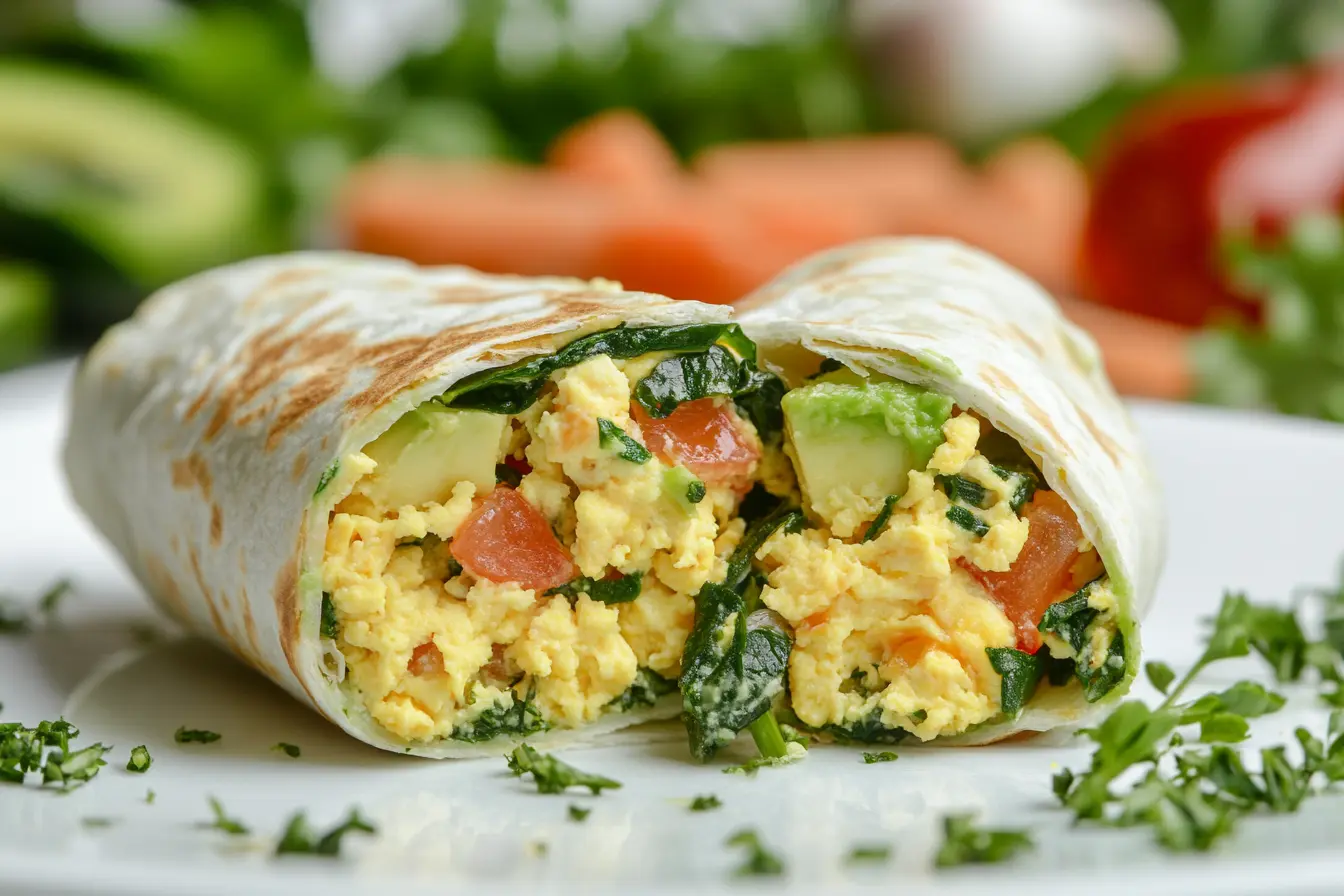In recent years, egg wraps have taken the food world by storm, particularly among those following low-carb and keto diets. But, Are egg wraps healthy? This question is more complicated than a simple yes or no. To determine whether egg wraps are a good option for you, we need to dive deep into their nutritional content, potential benefits, and possible drawbacks. In this comprehensive guide, we’ll explore everything you need to know about egg wraps, including how they compare to traditional wraps and how they can fit into a healthy diet.
What Are Egg Wraps?
Egg wraps are a type of low-carb alternative to traditional wraps or tortillas. Typically, they’re made from eggs, egg whites, and sometimes a gluten-free flour blend or oil. Their popularity has soared, thanks to their versatility and ability to fit into a variety of diets, from keto to gluten-free. Essentially, an egg wrap is like a thin omelet, flexible enough to hold various fillings, ranging from vegetables and meats to cheeses and sauces.
Egg wraps are available from several brands, including Trader Joe’s and Egglife. However, the concept remains the same across different products: a protein-rich, low-carbohydrate, gluten-free wrap that can serve as a replacement for more traditional grain-based options. For example, Trader Joe’s egg wraps offer only 60 calories per wrap with 8 grams of protein and just 2 grams of carbohydrates. These numbers are particularly appealing to anyone following a low-carb diet or looking to reduce their calorie intake.
If you’re curious about other low-carb alternatives for wraps, this guide on low-carb foods can help expand your options beyond egg wraps. It can offer insight into other healthy, low-carb choices to accompany your meals.
Nutritional Benefits of Egg Wraps
Egg wraps offer several nutritional advantages, making them an appealing option for many people. Their low-carb, high-protein content can be especially beneficial for those trying to reduce their carbohydrate intake or boost their protein levels. Let’s break down the key benefits:
1. Low in Calories
One of the most obvious benefits of egg wraps is that they are typically low in calories. A single wrap can range from 30 to 60 calories, depending on the brand. This makes them an excellent option for those who are trying to maintain a calorie deficit for weight loss. By swapping a traditional flour tortilla, which can contain anywhere from 150 to 200 calories, with an egg wrap, you can save a significant number of calories without sacrificing satisfaction.
2. High in Protein
Egg wraps are also high in protein. The primary ingredient, eggs, is one of the best sources of high-quality protein, containing all nine essential amino acids. Protein is essential for muscle maintenance, tissue repair, and even supporting metabolic functions. In fact, one egg wrap can provide up to 8 grams of protein, which is much higher than the average tortilla or wrap.
3. Gluten-Free
For people who suffer from gluten intolerance or celiac disease, egg wraps are a perfect alternative to regular wheat-based wraps. Since they don’t contain gluten, they’re easier on the digestive system for those who are sensitive. Moreover, gluten-free diets have gained popularity even among those without celiac disease, as they may help with reducing bloating and improving gut health. If you’re interested in exploring more gluten-free options, take a look at this guide to the gluten-free diet.
4. Low in Carbohydrates
Egg wraps usually contain fewer than 2 grams of carbohydrates per serving. This makes them a suitable option for anyone following a low-carb or ketogenic diet, which focuses on minimizing carbohydrate intake to encourage the body to burn fat for fuel. With so few carbs, egg wraps allow you to still enjoy a wrap-style meal without spiking your blood sugar levels.
5. Versatile in Taste
While egg wraps are bland in taste, this neutrality works to their advantage. Because they don’t have a strong flavor of their own, egg wraps can be used for both savory and sweet dishes. Whether you want to fill them with sautéed vegetables and grilled chicken or turn them into a dessert wrap with peanut butter and bananas, egg wraps are a blank canvas.
Potential Drawbacks of Egg Wraps
Although egg wraps are considered healthier alternatives in some respects, they aren’t without their drawbacks. Below are a few potential downsides to consider:
1. Low in Fiber
One of the major drawbacks of egg wraps is that they are low in fiber. Unlike whole grain wraps or tortillas, which can offer up to 4 grams of fiber per serving, egg wraps generally contain less than 1 gram of fiber. Fiber is an essential component of a healthy diet because it helps regulate digestion, keeps you feeling full longer, and promotes healthy cholesterol levels. If you’re using egg wraps as a regular part of your diet, it’s important to make sure you’re getting enough fiber from other sources, like fruits, vegetables, or whole grains.
For more information on how to incorporate fiber into a low-carb diet, check out this guide that provides practical tips on boosting your fiber intake without increasing your carbohydrate load.
2. Higher in Sodium
Many commercially produced egg wraps can contain relatively high amounts of sodium. Some brands have as much as 200-300 milligrams of sodium per serving. While sodium is necessary for balancing fluids in the body, too much sodium can contribute to high blood pressure and other cardiovascular issues. If you’re watching your sodium intake, be sure to check the nutrition label on your egg wraps or opt for homemade versions with less salt.
3. Cost and Availability
Compared to traditional wraps, egg wraps tend to be more expensive. Brands like Egglife and Trader Joe’s offer pre-made egg wraps, but they come at a higher price point than regular tortillas. Additionally, these specialty products may not always be available at your local grocery store, depending on where you live.
4. Smaller Portion Size
Another consideration is the size of egg wraps. They tend to be smaller than traditional flour or corn tortillas, which means you may need to use two wraps to feel fully satisfied. This could lead to increased consumption, particularly if you’re trying to stay within certain caloric limits.
Egg Wraps vs. Traditional Wraps: A Nutritional Comparison
To better understand how egg wraps measure up, let’s compare their nutritional profile to more common types of wraps like flour tortillas and whole wheat tortillas.
| Nutrient | Egg Wrap (1 wrap) | Flour Tortilla (1 wrap) | Whole Wheat Tortilla (1 wrap) |
|---|---|---|---|
| Calories | 30-60 | 150-200 | 120-150 |
| Protein | 6-8 grams | 2-3 grams | 4-5 grams |
| Carbohydrates | 2 grams | 25-30 grams | 20-25 grams |
| Fiber | <1 gram | 2-3 grams | 4-5 grams |
| Sodium | 200-300 mg | 150-200 mg | 150-250 mg |
Key Takeaways:
- Protein: Egg wraps provide significantly more protein than flour or whole wheat tortillas.
- Carbohydrates: Egg wraps are ideal for low-carb diets, as they contain very few carbs.
- Fiber: Traditional whole wheat wraps are a better source of fiber, so it’s important to pair egg wraps with fiber-rich foods like leafy greens or beans.
- Sodium: Egg wraps may have higher sodium content, so opt for lower-sodium brands or homemade options.
Are Egg Wraps Good for Weight Loss?
Egg wraps can be a useful tool for weight loss due to their low-calorie, high-protein composition. Protein helps to curb hunger and maintain lean muscle mass, which can be particularly helpful when trying to reduce body fat. Furthermore, the low carbohydrate content of egg wraps can help you reduce your overall calorie intake without feeling deprived.
However, the lack of fiber in egg wraps may lead to quicker digestion and faster return of hunger. To mitigate this, pair your egg wraps with fiber-rich ingredients like vegetables, avocado, or a side of whole grains to stay fuller longer. For example, filling an egg wrap with grilled chicken, leafy greens, and a scoop of guacamole can create a balanced, filling meal that supports weight loss without overloading on calories.
Incorporating Egg Wraps into Your Diet
Egg wraps can be used in various ways to suit both savory and sweet palates. Here are some creative ideas for incorporating egg wraps into your meals:
1. Breakfast Wraps
Start your day with a protein-packed breakfast wrap. Fill your egg wrap with scrambled eggs, spinach, turkey sausage, and a sprinkle of cheese. This low-carb breakfast will keep you energized without spiking your blood sugar.
2. Lunch and Dinner Wraps
For lunch or dinner, try filling an egg wrap with grilled chicken, avocado, and mixed greens. Add a dollop of hummus or Greek yogurt for extra creaminess and flavor. If you’re looking for more ideas on creating the perfect protein-packed lunch, this BBQ rib sandwich recipe offers great inspiration for different protein combinations.
3. Dessert Wraps
Yes, you can even use egg wraps for dessert! Spread almond butter or peanut butter on the wrap, add banana slices, and drizzle with honey for a healthy, sweet treat.
Homemade Egg Wrap Recipe
While store-bought egg wraps are convenient, making your own at home can save money and allow you to control the ingredients. Below is a simple, homemade egg wrap recipe that requires minimal ingredients and is easy to prepare.
Ingredients:
- 2 large eggs
- 1 tablespoon water or milk
- 1 teaspoon olive oil or butter for cooking
- Salt and pepper to taste
Instructions:
- Whisk the eggs: In a small bowl, whisk the eggs and water (or milk) until combined. Season with a pinch of salt and pepper.
- Heat the pan: Heat a non-stick skillet over medium heat and add the olive oil or butter.
- Cook the egg wrap: Pour the egg mixture into the pan, tilting the pan so the eggs cover the bottom evenly. Let the eggs cook for about 1-2 minutes until set.
- Flip and finish: Once the edges start to bubble, carefully flip the egg wrap with a spatula. Cook for another 30 seconds to 1 minute, until fully cooked. Remove from heat and let it cool slightly before filling with your favorite ingredients.
For more recipe inspiration, you might want to explore this best protein cookie recipe as a snack to complement your egg wraps.
FAQs
Are egg wraps healthier than traditional wraps?
Yes, egg wraps are typically lower in carbs and calories and higher in protein, making them a better choice for low-carb diets.
Can I freeze egg wraps?
Absolutely! Egg wraps freeze well and can be reheated without losing their texture.
Do egg wraps contain gluten?
Most egg wraps are naturally gluten-free, making them a great option for those with gluten sensitivities or celiac disease.
Are egg wraps good for weight loss?
Yes, their low-calorie and high-protein content make them an excellent choice for weight loss, as long as they are balanced with fiber-rich fillings.
Do egg wraps have fiber?
Egg wraps are low in fiber, so it’s important to incorporate fiber-rich ingredients like vegetables when preparing them.
Conclusion
Are egg wraps healthy?
Yes Egg wraps are healthy, low-carb alternative to traditional wraps, especially for those following keto or gluten-free diets. While they offer several nutritional benefits like being high in protein and low in calories, it’s essential to balance them with fiber-rich ingredients and other nutrient-dense foods to create a well-rounded diet. Whether you’re trying to lose weight, manage blood sugar, or simply cut carbs, egg wraps can be a delicious and versatile part of your meal plan.
For more great recipes and meal ideas, check out this delicious parmesan meatloaf recipe that can pair well with an egg wrap or serve as a high-protein dinner option.

